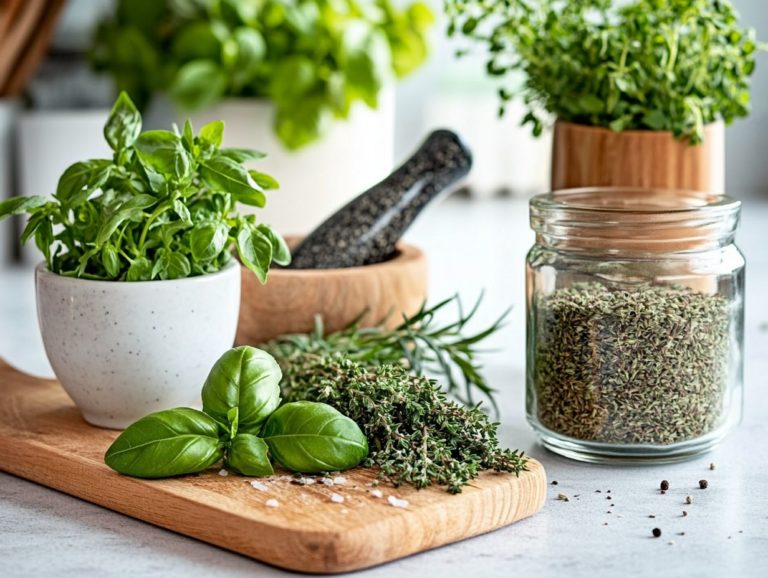Can Herbal Remedies Help with Allergies?
Allergies impact millions of individuals, bringing discomfort and disruption to daily routines. Understanding the various types of allergies and their common triggers is essential for effective management.
While many individuals rely on conventional treatments, herbal remedies are emerging as a compelling natural alternative. Discover how these remedies can change your life!
This article delves into popular herbs that offer allergy relief, highlighting their effectiveness supported by research, potential side effects, and practical tips for integrating them into your allergy management strategy. Explore how these remedies could offer a holistic approach to alleviating your symptoms.
Contents
- Key Takeaways:
- Understanding Allergies and Their Causes
- Herbal Remedies for Allergies
- Effectiveness of Herbal Remedies
- Potential Side Effects and Risks
- Incorporating Herbal Remedies into Your Allergy Management Plan
- Frequently Asked Questions
- Can Herbal Remedies Help with Allergies?
- Which herbal remedies are most effective for allergies?
- How do herbal remedies work to help with allergies?
- Are herbal remedies safe to use for allergies?
- Can herbal remedies be used in conjunction with traditional allergy medications?
- Are there any potential side effects of using herbal remedies for allergies?
Key Takeaways:

- Use herbal remedies wisely and consult a healthcare professional for the best results.
- Commonly used herbs for allergies include butterbur, stinging nettle, and spirulina, which have shown promise in reducing symptoms like sneezing, itching, and congestion.
- While there is some evidence to support the use of herbal remedies for allergies, more research is needed to confirm their effectiveness and to understand potential side effects and interactions with other medications.
Understanding Allergies and Their Causes
Understanding allergies and their underlying causes is essential for effective management, as they can considerably affect your quality of life. Allergies arise when your immune system protects against harmful substances. Allergens are substances that can cause allergic reactions, which may include pollen, dust mites, pet dander, and certain foods.
The impact of these allergies can manifest through a spectrum of symptoms. These range from mild reactions like sneezing and itchy eyes to more serious conditions such as respiratory issues and allergic rhinitis. Identifying these triggers is critical for developing suitable treatment plans and enhancing your overall immune health.
Types of Allergies
There are various types of allergies, each arising from distinct environmental and dietary triggers. These include allergic rhinitis, respiratory allergies, and food allergies.
Allergic rhinitis, often referred to as hay fever, presents with symptoms like sneezing, nasal congestion, and itchy eyes. It is typically triggered by pollen from trees, grasses, or weeds.
Respiratory allergies can emerge from pet dander, mold, or dust mites. These can result in coughing, wheezing, or difficulty breathing. Food allergies can elicit severe reactions, with symptoms ranging from hives to anaphylaxis, often provoked by common allergens like peanuts, shellfish, and dairy.
Seasonal allergies tend to vary with the changing seasons, driven by specific pollen counts. In contrast, food allergies are more constant and can trigger reactions at any time of year. Understanding these differences is crucial for effective management and treatment.
Common Triggers
Common triggers of allergies can vary widely, encompassing environmental factors like pollen count and mold. Everyday culprits such as dust mites and pet dander are also significant contributors to respiratory allergies and allergic rhinitis.
If you’re sensitive to these allergens, even minor exposure can unleash a storm of symptoms that includes sneezing, itching, and difficulty breathing. Pollen, in particular, has a notorious reputation for causing flare-ups during specific seasons, which is why keeping a close eye on pollen counts becomes essential for managing your symptoms effectively.
Taking control of your environment is crucial in mitigating allergy effects. By keeping your windows shut on high pollen days, using air purifiers, and regularly washing your bedding, you can significantly reduce your exposure and find relief.
With proactive measures in place, you can reclaim a sense of comfort in your daily life, even in the presence of these ever-common allergens. Start your journey to allergy relief today!
Herbal Remedies for Allergies

Herbal remedies for allergies offer a natural alternative to conventional medications. Ingredients like stinging nettle, butterbur, and quercetin can help alleviate symptoms and strengthen your immune health.
These natural solutions have gained attention for providing relief from allergies without the unwanted side effects typically linked to antihistamines. By exploring these 5 healing teas for seasonal allergies, you can discover effective strategies for managing allergies while improving your health.
Popular Herbs for Allergy Relief
Some popular herbs to consider for allergy relief include stinging nettle, butterbur, and quercetin. Each of these herbs has unique benefits that can provide you relief from allergy symptoms.
Stinging nettle has a long history of use for reducing inflammation and acts as a natural antihistamine, making it a superb option for those seeking respite from seasonal allergies.
Butterbur is equally noteworthy, with research indicating that it can significantly reduce nasal congestion and other respiratory symptoms when taken in the right doses.
Quercetin, a flavonoid found in many fruits and vegetables, helps stabilize mast cells to prevent histamine release and boosts overall immune function.
Clinical studies show these herbs can modulate immune responses effectively, potentially minimizing allergy flare-ups and enhancing respiratory health. Since recommended dosages can vary, it’s essential to consult a healthcare provider to ensure optimal usage for your needs.
Effectiveness of Herbal Remedies
The effectiveness of herbal remedies for allergies has captured the attention of researchers and health practitioners alike. A wealth of studies illuminates their potential in treating allergies. Evidence indicates that herbal preparations may provide significant relief from allergy symptoms, often with fewer side effects than conventional medications.
Research strongly supports adding natural remedies to your allergy management plan. Don t miss out on these effective options!
Evidence and Studies
Numerous studies have examined the effectiveness of herbal remedies in managing allergy symptoms, revealing promising results that support their role in enhancing immune response.
One notable study conducted at the University of Maryland investigated the impact of butterbur extract on seasonal allergies, showcasing a remarkable reduction in nasal symptoms that rivals conventional antihistamines. For those interested in understanding more about natural ways to alleviate symptoms, it’s helpful to explore how do herbal remedies work. Another research effort spotlighted quercetin, a natural compound sourced from various plants, which has proven effective in stabilizing mast cells and preventing histamine release.
A comprehensive meta-analysis of various herbal treatments indicated that patients often reported fewer side effects compared to synthetic medications. This fosters a growing interest in natural alternatives for allergy management. These findings highlight the potential for integrating top herbal remedies for skin allergies into established treatment protocols, offering you diverse options for alleviating allergic responses.
Potential Side Effects and Risks

Herbal remedies can be safe, but it’s important to be aware of possible side effects and risks. Consulting with a healthcare professional before embarking on any new allergy treatment is essential to ensure your well-being.
Consulting with a Healthcare Professional
Consulting with a healthcare professional is essential when considering herbal remedies for allergies. They can offer personalized advice that ensures safe and effective allergy management.
This advice is crucial for navigating your specific allergy challenges.
Navigating allergies can feel daunting. Resorting to self-treatment might lead to unintended consequences, such as allergic reactions or lackluster relief.
A seasoned professional has the expertise to pinpoint specific allergens and craft tailored management plans that address your individual needs.
They can also assist in thoughtfully incorporating herbal remedies into your current treatment regimen, optimizing benefits while minimizing potential risks.
This collaborative approach not only boosts efficacy but also fosters a safer, more effective strategy for managing allergy symptoms.
Incorporating Herbal Remedies into Your Allergy Management Plan
Embracing herbal remedies can transform your allergy management plan! They can be highly effective for alleviating symptoms, boosting overall immune health, and reducing your dependence on conventional allergy medications.
By gaining insight into how these natural treatments operate, you can create a holistic approach to managing your allergies with confidence.
This thoughtful integration not only paves the way for improved well-being but also enhances your quality of life, especially during those challenging peak allergy seasons.
Best Practices and Tips
To effectively weave herbal remedies into your allergy management plan, it s crucial to adhere to best practices that enhance both their effectiveness and safety.
Begin by familiarizing yourself with various preparation methods like teas, tinctures (which are concentrated herbal extracts), and capsules. These can impact the potency and absorption of the herbs.
Dosage is another key consideration; starting with lower amounts allows you to assess how your body responds before gradually increasing based on your individual tolerance and symptom relief.
Timing is also significant, especially when integrating natural treatments during seasonal shifts. Complementing these remedies with lifestyle adjustments, such as maintaining a clean environment and steering clear of known triggers, can significantly bolster overall effectiveness.
By regularly monitoring your symptoms, you can fine-tune your herbal regimen, fostering a personalized approach that addresses your specific needs and enhances your well-being.
Frequently Asked Questions

Can Herbal Remedies Help with Allergies?
Yes, herbal remedies have been used for centuries to help alleviate allergy symptoms.
Which herbal remedies are most effective for allergies?
Some of the most effective herbal remedies for allergies include butterbur, stinging nettle, and quercetin.
How do herbal remedies work to help with allergies?
Many herbal remedies contain natural anti-inflammatory and antihistamine properties that can help reduce allergy symptoms.
Are herbal remedies safe to use for allergies?
When used correctly and in recommended doses, herbal remedies are generally safe for treating allergies. However, it is important to consult with a healthcare professional before starting any new treatment.
Can herbal remedies be used in conjunction with traditional allergy medications?
Yes, herbal remedies can be used alongside traditional allergy medications. However, it is important to consult with a healthcare professional before doing so to ensure there are no potential interactions.
Are there any potential side effects of using herbal remedies for allergies?
While herbal remedies are generally safe, there is still a risk of potential side effects such as stomach upset, headache, or allergic reactions. It is important to use these remedies as directed and to stop using them if any adverse reactions occur.






